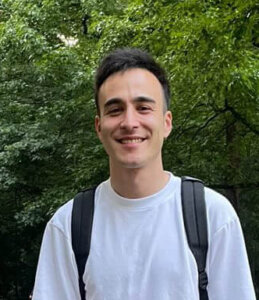Queens College has been a model of Muslim-Jewish cooperation. Can it stay that way after Oct. 7?
A student body that is 1/3rd Jewish and 1/6th Muslim struggles for harmony amid war
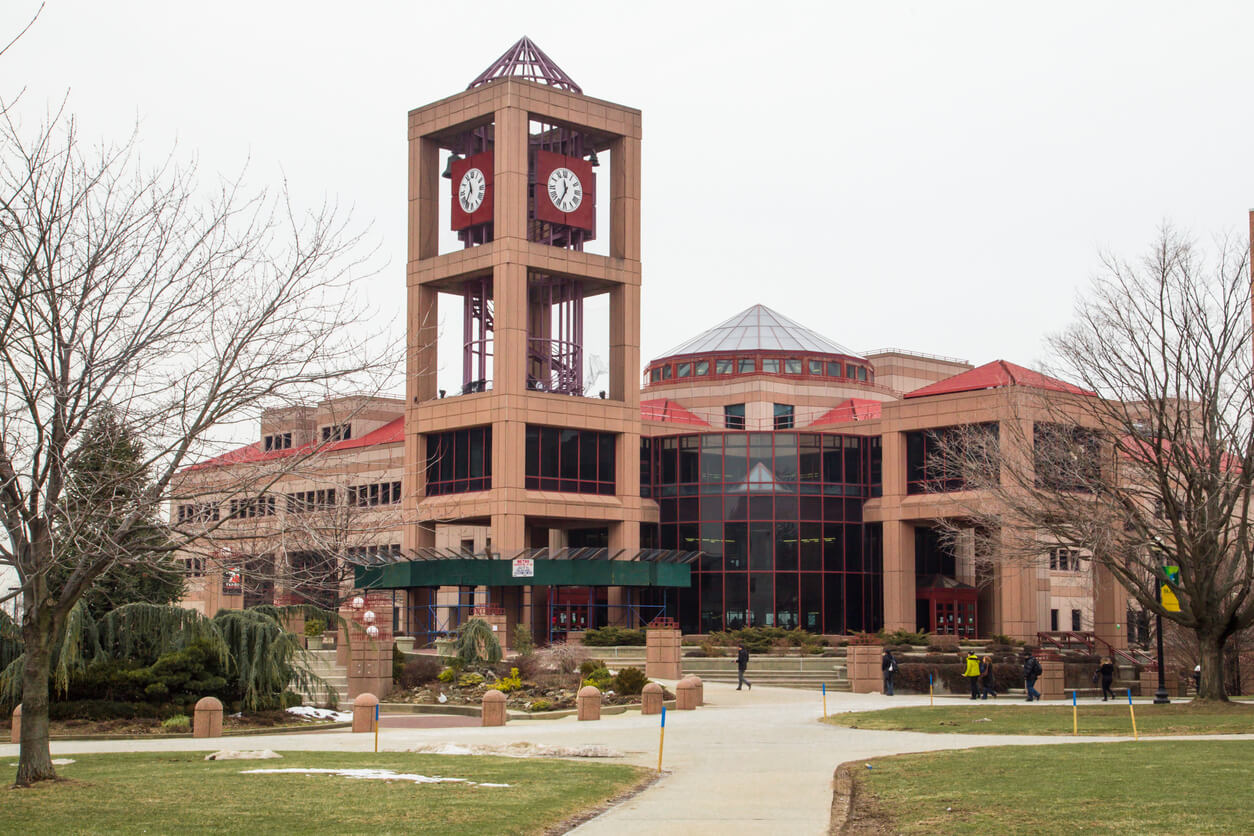
View of the Rosenthal Library at Queens College in New York. Photo by iStock/Littleny
At the City University of New York’s Queens College, Muslim and Jewish students can find sanctuary across opposite sides of a carpeted hallway. On one side, an open door leads into the prayer room of the Muslim Students Association, where, depending on the time of day, young men chat about their classes or kneel on the colorful carpet and pray in Arabic.
Just a few feet away, on the other side of that narrow hallway, Jewish students gather at the campus Hillel for board games and afternoon mincha.
This cozy arrangement, on the second floor of the Student Union, is square one of what a Queens College professor once called a “laboratory for diversity” in central Queens. Of the college’s more than 19,000 students hailing from 145 countries, about one-sixth are Muslim. Another 30% are Jewish, making it, according to Hillel International, the most Jewish public university in the nation per capita.
Last academic year, an interfaith student group hosted a discussion on the religious significance of hairstyles in the campus dining hall, and a candlemaking session and open mic in the student union. On any given afternoon, one might find MSA members playing ping pong in the Hillel lounge.
This year, things are a little less fluid. Since Hamas’ attack on Israel on Oct. 7, and the subsequent Israeli siege of Gaza, the interfaith group has had a quieter presence. MSA members no longer come to Hillel for ping pong.
At the entrance to the Hillel lounge, the organization’s logo is surrounded by posters with the word “KIDNAPPED” above photos of Israeli hostages held in Gaza by Hamas. Across the hallway, the MSA’s bulletin board displays a Palestinian flag and posters with a similar design that instead read “MURDERED BY ISRAEL” above photos of deceased Gazans.
A private security officer now guards Hillel’s entrance, and a public safety officer stands watch in the second floor lobby.
The war has strained the bonds between certain Jewish and Muslim students, but it hasn’t torn them completely. I spoke to a Muslim student offended by an IDF soldier’s visit to campus; a Jewish student angered by the visit of an anti-Israel Muslim cleric; a Muslim student who had been called “ISIS” by a classmate; a Jewish student who had been shouted down at an interfaith event for being a Zionist. None of them directed their ire at a religion, no matter how enraged they were.
In some places, the ideal of a pluralistic university is very much alive. Hillel and MSA members still stop to chat in the Student Union hallway. Devout Jews and Muslims meet outside class to discuss scripture. The Middle East studies department remains a laboratory of Muslim-Jewish dialogue. A Muslim student comforted the Jewish student who got yelled at, and gained a new friend in the process.
And the Muslim and Jewish students who felt most hurt by the university or their peers had not given up. They all expressed a longing for something that has slipped out of reach these past seven months: dialogue.
‘More than welcoming’
A young man with a trim beard looked up from his sandwich and fries and smiled at me. “You picked the perfect person to talk to,” he said.
He had been sitting alone in the lobby of the second floor of the Student Union, where many students in the Muslim Student Association hang out because they don’t have a dedicated lounge. The student, a senior and an MSA member, asked that I not use his name in an article for fear of harassment.
“I have a great relationship with the whole Hillel Center here,” he said.
He was a Middle Eastern studies major — a path he chose so he could become a leader and educator in the Muslim community. In the process, he has learned a great deal about Judaism. He counts a group of Orthodox Jewish men — “They call them ‘Ortho-bros,’” he said — and left-leaning Israelis among his friends.
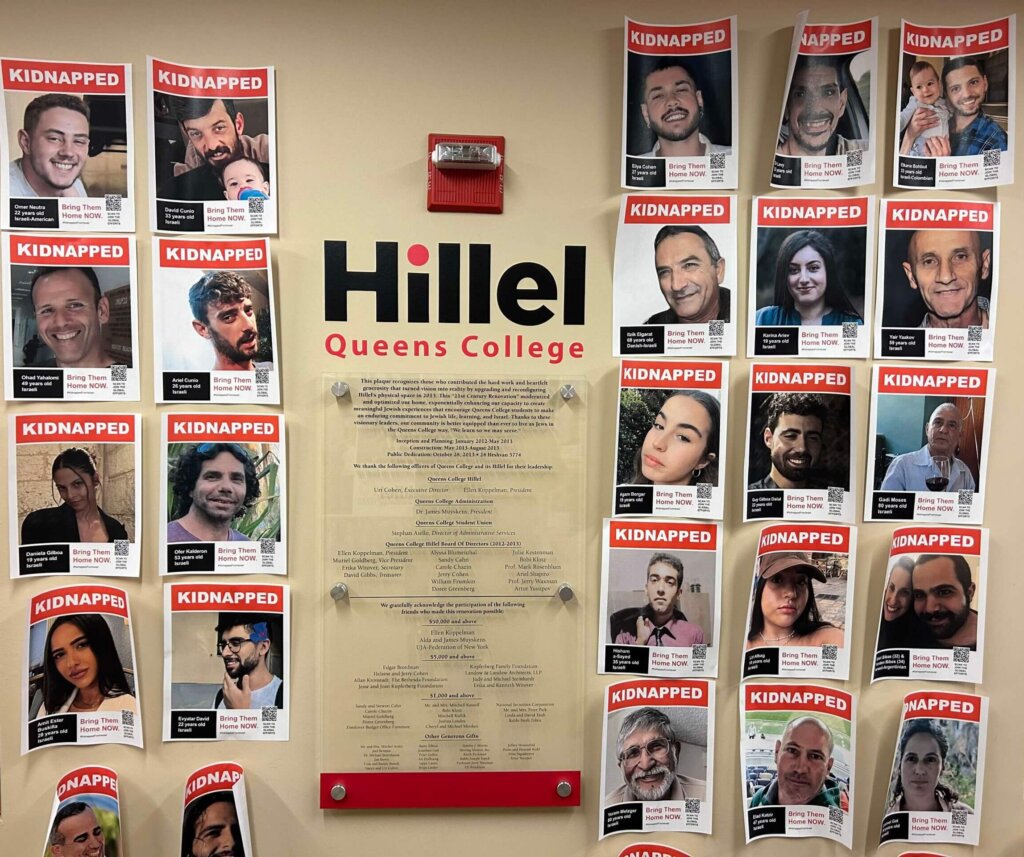
He often goes to Hillel to meet with an Orthodox friend. “Whenever I have a question about the Talmud, or the Torah, I meet with him,” he said. “He translates everything for me — like, straight from the Hebrew.”
This close relationship with the Jewish community has lent him a balanced perspective on incidents that have arisen between the MSA and Hillel in recent months — including an incident that affected him directly.
Around a month ago, he said he and his friend were chatting in the lobby, and a Jewish student walking by called them “ISIS” — a label that another Muslim student told me he had been called, too.
Despite feeling hurt by the racist slur, he didn’t blame the Jewish community at large. That hateful student was “an exception, you know?” he said. “The professors that I know and my friends here are more than welcoming to me.”
He said that the the Muslim community was similarly welcoming toward Jews on campus — they might take issue with Zionism, but “inherently Islam is very positive toward Judaism.”
Palpable tension
A student leader who I spoke with at Hillel didn’t feel so comfortable around MSA members. “Tension on this floor could sometimes be palpable,” said Avi Koenig, the student president of the Jewish organization. He said that, multiple times since Oct. 7, the MSA had promoted ideas that made him and other Jewish students feel threatened.
In the days following Hamas’ attack on Southern Israel, the MSA took on some of the pro-Palestinian advocacy that political organizations at other colleges often do, in part because Queens College lacks an officially recognized Students for Justice In Palestine chapter. Soon after Oct. 7, the MSA’s Instagram story began to include anti-Zionist posts, which some Jews accused of crossing over into antisemitism. Some of the most widely criticized posts included one questioning the veracity of certain Israeli claims about Oct. 7, and another that said that Hamas was justified in taking Israeli hostages.
Koenig said that he messaged the MSA on Instagram to complain about the posts, but the club never responded.
A prominent member of the MSA, who asked to go by his second name, Haroun, later acknowledged to me that the post justifying the taking of hostages wasn’t “appropriate,” and that “no one wants hostages,” but that the post was meant to address the double-standard that Hamas faces while Israel holds almost 10,000 Palestinian prisoners.
As for the post that questioned some of Israel’s claims about Oct. 7, Haroun said, “There still hasn’t been corroborating evidence for it. So I think it still stands.”
In November, Queens College President Frank Wu wrote an open letter that denounced the posts and said that the administration would consider disciplinary measures and had “contacted and will continue to cooperate with the NYPD regarding these incidents.”
The administration’s harsh rebuke of the MSA was criticized by the Foundation for Individual Rights and Expression as a “blatantly unconstitutional violation of the student group’s First Amendment rights.” Some Muslim students have said they felt betrayed by the administration’s cooperation with the NYPD in investigating the MSA, linking it to a history of the city surveilling the Islamic community.
Wu told me that he had not reported Muslim students to the NYPD, but rather “worked with the NYPD 107th precinct Community Affairs Office” in discussing social media posts that some Jewish community members had flagged.
Koenig told me he was satisfied with Wu’s response. He gives the administration “a lot of credit,” he said, for saying that denying Hamas’ atrocities is “reprehensible and that hate speech is never okay.”
Now, when Koenig walks by MSA students in the lounge, he feels “unsettled by the thought of knowing what they posted,” he said.
Still, he made a point of saying that he hasn’t had any negative personal experiences with members of the MSA. He assumed that “a lot of people who are in the MSA do not agree with the rhetoric of their leaders and the stuff they’re posting,” and added that he had “heard from a bunch of people that, you know, the president of the MSA is a very nice guy,” and his inclination is to believe them.
Koenig and the MSA president haven’t met since October, and the MSA hasn’t apologized for the posts.
Given the historical goodwill between the two groups, Koenig said, “I think the relationships can be healed.” He just hoped that it didn’t take too long.
A double standard
After the president’s condemnation of the MSA’s rhetoric, the club stopped sharing the types of posts that offended some Jewish students. But in the spring semester, controversy erupted again when the MSA invited Daniel Haqiqatjou, a Muslim scholar, to speak on campus. Haqiqatjou has drawn accusations of misogyny and antisemitism throughout the years; he has claimed that women getting college educations leads them into sex work; and he has written a series of “Interfaith Critiques” in which he looks into Jewish texts and presents evidence that they justify things like racial hatred, homophobia, and criminal conspiracy.
Again, Wu made a statement of condemnation against Haqiqatjou’s views, but allowed him to speak in the name of freedom of expression.
To Koenig, who attended Haqiqatjou’s talk, the cleric’s work, some of which focused on how the immorality behind Israeli war crimes is prescribed by Judaism, was deeply antisemitic — an attempt to prove “how barbaric observant Judaism is.” With this type of speech platformed by MSA, Koenig felt as if people on campus believed that Judaism was depraved at its core.
Haroun said Haqiqatjou was responding to the way that people falsely claim that the Quran promotes violence. Haqiqatjou’s analysis was meant to expose the thinking that animated Jewish extremists, the cleric had made clear that not all Jews hold these views, and that they actually shared much in common with Muslims, Haroun said. When I asked Haroun if he understood why some people found Haqiqatjou’s speech offensive, he said he did.
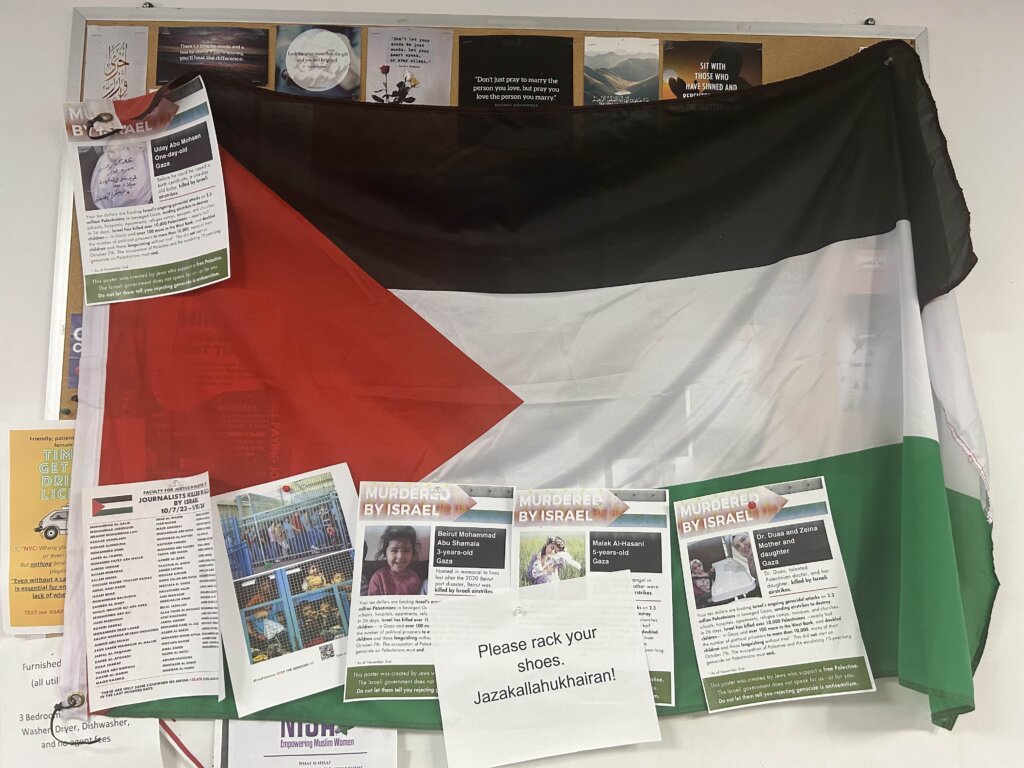
Still, he, along with the other Middle Eastern studies major I spoke to earlier, found the administration’s public condemnation of Haqiqatjou to be evidence of a double standard. Wu had made it clear that antisemitism and anti-Israel sentiment would be subject to institutional — and even police — crackdown. Islamophobic and anti-Palestinian sentiment, on the other hand, received no such forceful condemnation.
Soon after Haqiqatjou’s visit, the Israeli Student Association hosted a speaking event by an Israel Defense Forces soldier. The administration issued no statement against the IDF speaker.
Haroun said that in allowing the IDF speaker to come to campus, the university welcomed someone “who is part of a military army that has probably murdered, imprisoned, raped, butchered” Palestinians.
“We have students who are Palestinian. Their families could have been one of those people,” he said. “There was no kind of message given to console the Muslim population.”
The MSA member I had spoken to in the lobby said that not only does the university take Muslims’ complaints less seriously than they should, they also tend to cast blame on them more easily. “There probably is some antisemitism on campus,” he said, but the MSA isn’t the source. “The administration has a hammer and no nail — the only nail they have is the Muslim Student Association.”
Haroun also said that one of the university’s solutions to rising tensions — posting a security guard on the second floor of the Student Union — threatened Muslims as much as it protected them.
MSA members are currently suing the CUNY administration for civil rights violations, saying that guards have taken notes on MSA meetings, ordered students to stop the Arabic call to prayer, and contributed to a stereotype that Arab, Palestinian, South Asian, and Muslim students are inherently dangerous (a communications officer for the university told me via email that “The allegation that a campus Public Safety officer has taken notes on MSA meetings is unfounded”).
“We feel safe with more security,” Haroun said. “But who are they going to tackle if there’s a situation?”
‘A laboratory for diversity’
Even as tensions rise in the Student Union, many Queens College students I spoke with described a relatively harmonious campus.
A Jewish graduate student involved in pro-Palestinian organizing told me that he hadn’t experienced antisemitism on campus, and said that the discomfort some Jews on college campuses felt was more a result of anti-Israel than anti-Jewish sentiment. A Muslim graduate student named Sakib said that, “overall, the campus is quite friendly,” and that he had “only had good interactions with other Jewish students and faculty.” An MSA member said that he was still forming his opinion on the war, and felt that conflict didn’t affect him directly, in part because he doesn’t have family in the region.
Several non-Jewish, non-Muslim undergraduates told me that compared to what they had heard about other campuses from friends and news reports, conflict at this CUNY branch was muted.
The college’s Middle Eastern studies department remains something of a haven for Muslim-Jewish cooperation. In professor Sophia McGee’s “History of Israel/Palestine” class, featured in a 2016 Forward story, McGee leads a diverse group of students, the majority of whom are Jews and Muslims, through role-playing exercises in which students act as Israeli and Palestinian peace negotiators. It’s long been a remarkable exercise in empathy. This year, McGee, who is Jewish and also CUNY’s Director of Intercultural Student Engagement and Dialogue, had to steer the class through its biggest challenge yet.
“It was really difficult,” she said.
One of McGee’s students lost a family member in Gaza during the first two weeks of the war. Another was in Israel on Oct. 7.
In the days after Hamas’ attacks, McGee received messages from students, Muslim and Jewish alike, saying that they were afraid to come to campus for fear of being attacked. She moved the first class to Zoom. The next week, she resumed in-person instruction, offering to walk students in groups from the campus gates if necessary.
As the semester wore on, students told McGee that the challenge of the class was no longer “having uncomfortable conversations. It was actually, like, about being deeply wounded,” she recalled. “The line had shifted.”
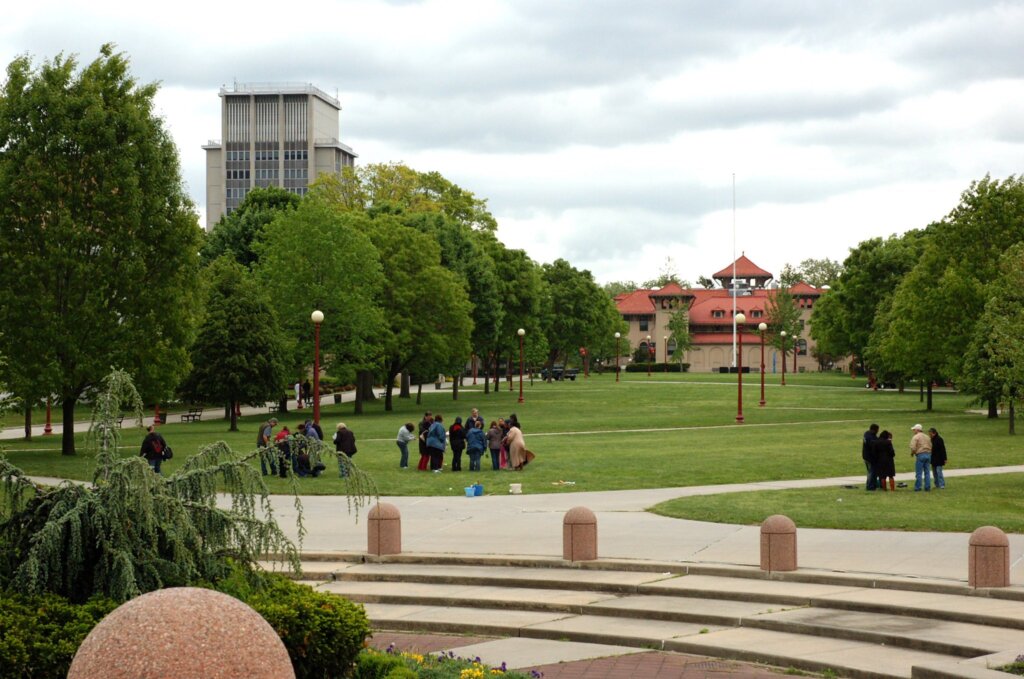
To avoid poking too much at healing wounds, McGee zoomed the class out onto the wider geopolitics surrounding the conflict. She scaled down the role-playing she usually did, and students avoided the type of head-on tough discussions they engaged in during semesters past. No major fights erupted, and everyone kept engaging in class in a way that she said she found amazing: “I just kind of wonder if I would have had that kind of resilience, you know, under those circumstances.”
Another professor, Arnold Franklin, head of the university’s Jewish studies department, maintained the collaborative culture of his class, “Jews and Muslims in the Middle Ages,” by keeping the focus on an era where the two Abrahamic faiths were deeply entwined.
During his first class, students read aloud from PowerPoint slides featuring manuscripts from the Middle Ages, one in Arabic letters and one in Hebrew letters. Jewish students stumbled reading aloud from the text written in Hebrew, because the words themselves didn’t sound like anything they were used to.
“Muslims in the room, suddenly, their ears start to perk up because they realize what they’re reading,” he said. The text on display was “the first chapter of the Quran.” Muslim students had the reverse experience reading aloud from the slide written in Arabic, which, it turns out, is a copy of the Torah.
“Jews spoke and wrote in Arabic all the time,” Franklin said. Much of his research focuses on medieval Egypt, where Maimonides was a prime example of a “flourishing, productive Jewish life in a totally, you know, kind of Arabized Islamic environment.”
I asked Franklin why he thought the college’s diverse student body, despite some recent flare-ups, seemed to be able to put aside its differences and get along.
He thought the answer lay in the college’s status as a working-class commuting school in the heart of one the country’s most diverse counties. His students “live at home, they’re closely connected with families, and a lot of them work,” he said. The majority of them are immigrants or the children of immigrants. They’re constantly exposed to diversity, and they can’t indulge, he said, “in a kind of idea bubble” in the way that students living on other campuses might.
Even Haroun, who shared countless examples of students and the administration targeting and misunderstanding the MSA, voiced hope as we sat cross-legged on the carpeted prayer room floor.
Our conversation began with him looking for his backpack to show me the Torah that he consults as he studies Jewish liturgy. He then described how, even while caught in the crossfires of controversy, MSA and Hillel members still sometimes stop and greet each other in the hallway, “and then the group just all of a sudden mixes up. And then we have conversations.”
Later, he described his aspirations for Jewish-Muslim relations on campus. “To be able to have some sort of dialogue in terms of everyday discourse — not to be afraid to speak about what we believe is the right thing,” he said. “Everyone will find that there’s very, very genuinely nice people from both sides.”



